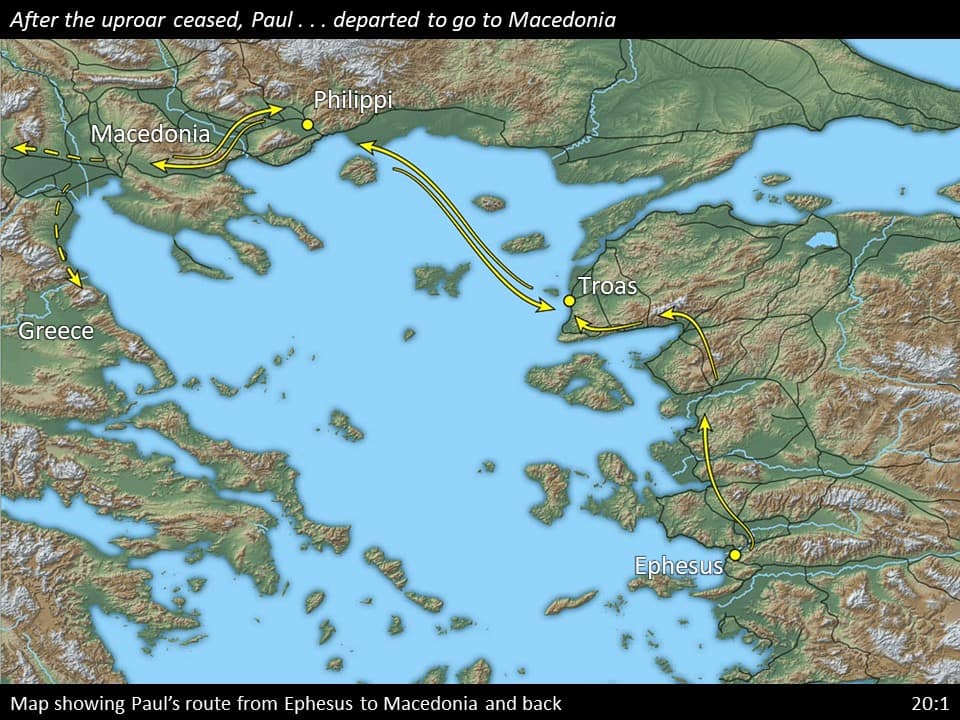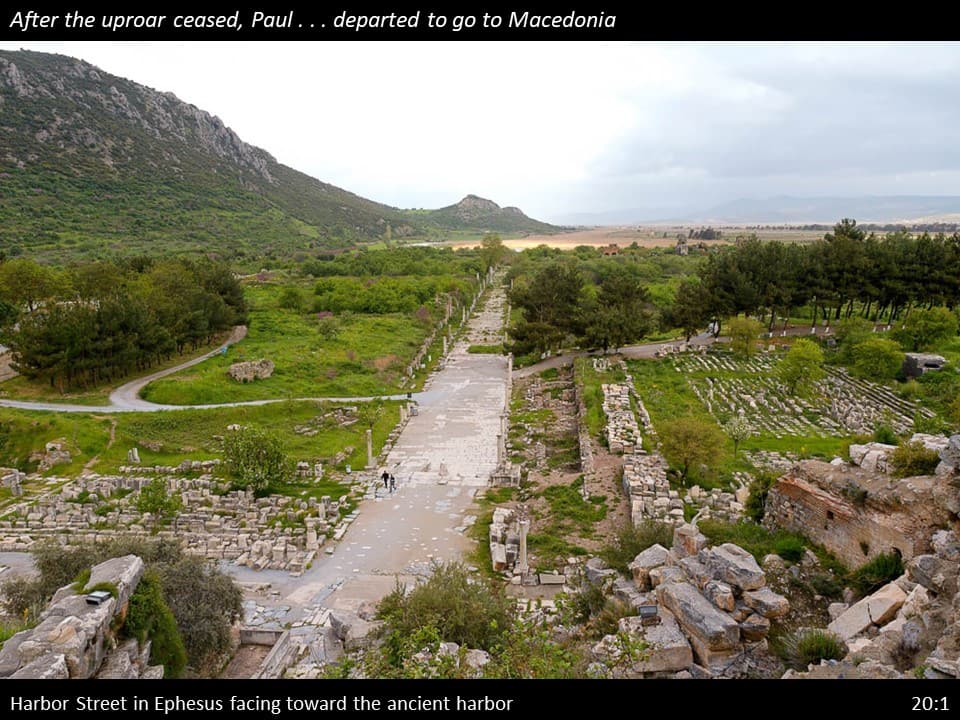What I Noticed Today (Acts 20-23)
Acts 20












In verses 1-6, Paul assembled the disciples in Ephesus, encouraged them, and then left for Macedonia.
Note: Verse 2 says Paul “passed through those areas and exhorted them.” This was probably Philippi and Thessalonica.
Paul arrived in Greece and stayed there for about three months. Just when he was about to leave, the Jews plotted against him, so he left going back through Macedonia accompanied by Sopater, Aristarchus, Gaius, Timothy, Tychicus, and Trophimus. These men went ahead to Troas.
Note: In Greece, Paul was probably in Corinth and Athens.
Note: In verse 6, Luke switches back to “we,” so he had apparently rejoined Paul.
Paul and Luke sailed from Philippi after the Feast of Unleavened Bread. They reached Troas in five days and spent seven days there.
Note: The trip from Philippi to Troas is about 150 miles.
In verses 7-12, Luke describes the disciples assembling on the first day of the week (Sunday) to break bread. Paul spoke late into the night, and as he spoke, a young man named Eutychus fell asleep and fell through the window to the ground below. He was presumed dead, but Paul embraced him, and he came back to life. Paul continued speaking until dawn, and then he left.
Note: Verse 7 is the clearest example in the New Testament of the disciples gathering for a normal meeting on Sunday.
Note: Eutychus means “fortunate, ” and he was truly fortunate that night!
In verses 13-16, Luke and the other men went ahead by ship while Paul apparently stayed in Troas a while longer and then traveled to Assos, where he met up with Luke. From Assos, they sailed to Chios, then to Samos, and on to Miletus. They bypassed Ephesus because Paul was in a hurry to reach Jerusalem by Pentecost.
Note: In verse 15, Luke ends the “we” section, indicating Paul went on without Luke.
In verses 17-38, Luke describes Paul’s meeting with the Ephesian elders.
While in Miletus, Paul sent for the Ephesians elders, and when they arrived, he delivered his farewell speech to them.
Note: Miletus is about 30 miles south of Ephesus. The presumption is the ship Paul was taking to reach Jerusalem was not leaving for a few days giving him time to meet with the elders from Ephesus.
Note: Paul’s farewell speech to the elders of Ephesus is the only one recorded in Acts that was delivered to a group of believers.
His sermon to the elders can be divided into three sections:
- In verses 18-21, a review of his past three years of ministry in Ephesus. How he did not avoid trials but preached to both Jews and Gentiles a message of repentance and faith in Jesus.
- In verses 22-27, a review of his current plan to journey to Jerusalem. That he knew he would face affliction but was being guided by the Holy Spirit. He would never see them again.
- In verses 28-35, a review of the future responsibilities of the Ephesian elders. How they were to be on guard against those who would come against the church and those who would rise up among them with deviant doctrines. He committed them to God’s grace which is able to strengthen leading to an inheritance of eternal life for those made holy (sanctified). He provided for himself as an example to them.
Note: Paul uses five different words to describe how he communicated the Gospel in verses 20-27: preach (v. 20), taught/teach (v. 20), declared (v. 21), testifying (v. 24), and proclaim (v. 27).
In verses 36-38, after this, he knelt down and prayed with them, and when they had said their goodbyes, they escorted him to the ship.
Acts 21
























In verses 1-13, they set sail for Cos, then to Rhodes, and on to Patara. They changed to a ship headed to Phoenicia, sailing past Cyprus and Syria, they arrived at Tyre, where the ship unloaded cargo. They stayed in Tyre for seven days with disciples. The Holy Spirit told the disciples to warn Paul not to go to Jerusalem. When their time was up, the disciples and their families said goodbye to Paul and his men. Paul boarded the ship and sailed to Ptolemais, where they stayed with brothers for a day before sailing on to Caesarea, where they stayed with Philip.
Note: Verse 1 begins another “we” section that lasts through verse 18, indicating that Luke had rejoined Paul.
Note: This was Paul’s first stop in Tyre (vv. 3-6), but the disciples there established a close relationship with him in just a few days.
Philip had four virgin daughters, all of whom had the gift of prophecy. While Paul was with Philip, a man named Agabus came from Judea. He said the Holy Spirit warned Paul that when he arrived in Jerusalem, he would be bound and turned over to the Gentiles. Upon hearing this, they begged Paul not to go to Jerusalem. Paul said he would go to Jerusalem as this was the Lord’s will. He was ready to not only be bound but to die for the Lord Jesus.
In verses 15-25, some of the disciples from Caesarea went with Paul to Jerusalem, taking them to stay with a man named Mnason, a Cypriot and an early disciple.
Note: Mnason and Barnabas were both originally from Cyprus.
The following day, Paul and the disciples met with James and the elders of the Jerusalem church. They told them about all the work God had done among the Gentiles through his ministry. When they heard this, they praised God.
However, the Jerusalem elders were concerned about false reports from zealous Jews who said Paul was teaching Jews not to circumcise their children or to follow Jewish customs.
James suggested Paul take a vow with four men and pay to shave their heads to satisfy the Jewish believers that Paul still followed Jewish customs.
Note: The shaving of the head accompanying a vow was typical for a Nazirite vow. At the end of the vow period, offerings were to be made at the temple. The suggestion was Paul would underwrite these expenses for the four men as a way to demonstrate his support of the Jewish traditions.
In verses 26-36, Paul took the vow with the four men and entered the temple, announcing the completion of the vow. Jews saw Paul in the temple, and a similar situation erupted with Jews claiming that Paul was teaching against Jewish Law. They also accused him of taking a Greek (a gentile) into the temple. They seized him, dragged him out of the temple, and closed the doors behind him.
A Roman commander heard what was going on and took soldiers to where they were beating Paul. There was such a commotion that the centurion couldn’t find out what Paul had done wrong, so he had him arrested, bound with chains, and taken to the barracks. Even with the soldiers protecting him, the people continued trying to kill Paul.
Note: This is the sixth time a Jewish crowd was incited against Paul and his ministry (Acts 14:19, 16:19-22, 17:5-8, 19:25-34, and 21:27-36).
Note: The Roman Fortress of Antonia was located next to the temple. A number of Roman troops were stationed there with additional troops brought in during Jewish feasts. Claudius Lysias was the Roman commander of the Tenth Legion (a legion was 1,000 soldiers) stationed in Jerusalem.
Note: Verse 32 says the commander took centurions (plural). Each centurion was in charge of 100 soldiers, so the commander took at least 200 soldiers to investigate what was going on with Paul.
In verses 37-40, Paul, speaking Greek, asked if he was allowed to speak to the commander. The commander was surprised Paul could speak Greek. He had assumed Paul was actually an Egyptian who started a rebellion and led 4,000 assassins into the wilderness.
Note: The word translated “assassins” literally means “cut-throats.” Josephus, the Jewish historian, wrote that in A.D. 54, an Egyptian rebel attacked the city of Jerusalem but was driven back by the Romans.
Paul explained to the commander that he was a Jewish man from Tarsus of Cicilia. The commander gave Paul permission to speak. Paul addressed the crowd on the steps of the Roman barracks in the Hebrew language.
Note: The Hebrew language of this time was Aramaic, which is a Semitic language closely related to traditional Hebrew.
Acts 22
























In verses 1-21, Luke records Paul’s speech which is a defense or an apology. It is the first of such apologetic speeches recorded in Acts.
Paul addressed the crowd in Aramaic, and they quieted down. He explained that he was Jewish, born in Tarsus, educated by Gamaliel in Jerusalem according to strict standards of Jewish Law. He spoke of how he had persecuted the church (the Way) with the full approval of the high priests and elders.
Paul then related his Damascus road experience; how the Lord had visited him, blinded him for three days, Ananias had helped him regain his sight, and how he realized God had appointed him to bear witness to His Son. He received a vision in the temple, saying they would not accept his testimony. Paul admitted to standing over Stephen and approving as the Jews killed him. Then the Lord told Paul to go because He was sending him far away to the Gentiles.
In verses 22-29, as soon as Paul mentioned preaching to the Gentiles, the crowd called out for Paul to be killed, saying he did not deserve to live. The people threw off their cloaks and flung dust into the air.
Note: Throwing off their cloaks and flinging dust into the air was an expression of intense anger.
The commander did not understand Aramaic, so he didn’t understand what was going on. He had Paul taken inside the barracks and ordered Paul scourged to find out why the crowd was shouting against him. Just as they were about to start scourging him, Paul asked the centurion if it was legal to scourge a Roman citizen who had not been convicted of a crime. The centurion reported this to the commander. The commander said he had purchased his Roman citizenship, but Paul said he was born a Roman citizen. The commander was concerned that he had bound and nearly flogged Paul since he was a Roman citizen.
Note: It was illegal for a Roman citizen to be bound and flogged without a trial.
In verse 30, the next day the commander wanted to find out why Paul was being accused by the Jews, so he released Paul and instructed the chief priests and Sanhedrin to convene and brought Paul before them.
Some thoughts for further consideration:
- Other disciples warned Paul not to go to Jerusalem. The Holy Spirit brought a message to tell Paul what kind of persecution was ahead in Jerusalem. But Paul would not be dissuaded from following God’s will no matter what trials he might face.
- Accusers in Jerusalem lied about Paul’s teaching, stirred up the entire city of Jews against him, and attempted to kill him. People will also lie about God’s servants today, thinking they can stop God’s Word.
Acts 23


















In verses 1-10, Luke records the trial of Paul before the Sanhedrin.
The Roman commander brought Paul before the Sanhedrin the next morning. Paul told the assembly he had lived with a clear conscience in his ministry. The high priest, Ananias, ordered some men to strike Paul on the mouth. In response, Paul said God would strike the high priest and called him a whitewashed wall.
Note: The commander decided to bring Paul before the Sanhedrin because if the issue had to do with Jewish law, the Sanhedrin would resolve it. If, however, Paul was in violation of some Roman law, then he could be turned over to the Roman proconsul.
Note: In Jewish law, the accused was presumed innocent until proven guilty. So in striking Paul, the high priest was being hypocritical: he was presuming to be a righteous judge while breaking the law himself.
Note: Paul’s reference to the high priest being a whitewashed wall means Ananias looked good on the outside but was deteriorating on the inside.
Paul said he did not recognize the high priest because he knew it was wrong to speak evil of a ruler of the people (quoting Exodus 22:28).
Note: Since Paul had looked intently at the high priest, it’s hard to understand how he would not have recognized the high priest. Two possible explanations are the high priest was not in his priestly garments since it was early in the morning, and Paul had not been around the Sanhedrin for many years so he may not have known the high priest.
When Paul realized that some of the Sanhedrin were Pharisees and some were Sadducees, he said that he was being judged simply because he believed in the resurrection of the dead. This started a huge argument between the Pharisees and the Sadducees because the Sadducees do not believe in resurrection, spirits, or angels. However, the Pharisees do believe.
Eventually, the scribes of the Pharisees said there was no evil in Paul, suggesting that perhaps God had sent a spirit or angel to speak to him. As the argument grew more intense, the commander removed Paul and took him back to the barracks.
In verses 11-22, the following night, the Lord stood by Paul encouraging him saying as he had testified in Jerusalem, you must also testify in Rome.
A group of 40 Jews bound themselves together by a curse saying they would not eat or drink until they had killed Paul. They even went to the chief priest and elders to inform them of their vow and include them in the conspiracy to kill Paul.
Paul’s nephew (the son of Paul’s sister) heard of the plot to ambush and kill Paul and went to the barracks and told Paul. Paul then told one of the centurions to take the young man to tell the commander. He told the commander about the plot to kill Paul, and the commander told him not to tell anyone he had reported the plot.
Note: This is the first mention of Paul’s sister and nephew being in Jerusalem. Perhaps they had moved there from Tarsus. The Greek for “young man” suggests Paul’s nephew was at least in his late teens and perhaps in his 20’s. It is unclear how the nephew heard about the plot.
In verses 23-35, the commander gathered two centurions and told them to gather 200 soldiers, 70 cavalries (soldiers on horses), and 200 spearmen (470 soldiers total) and be ready at 9 pm to take Paul to Caesarea.
He then wrote a letter to the governor, Felix, explaining the background of the issue with Paul, the Sanhedrin, and the plot against Paul’s life. He considered Paul innocent, but the dispute was a matter of Jewish law.
Note: The commander’s letter put himself in the role of rescuer and protector of Paul, but he left out the details of illegally binding and nearly flogging Paul before he learned that Paul was a Roman citizen. A letter containing the statement of facts was a requirement in the Roman army when a subordinate referred a case to a superior officer.
During the night, soldiers took Paul to Antipatris, and the next day they returned to the barracks allowing the cavalry to take Paul on to Caesarea.
Note: It was about 35 miles from Jerusalem to Antipatris, which is a considerable distance to cover beginning at night and arriving the next day. It was about 27 miles from Antipatris to Caesarea.
In verses 33-35, the soldiers delivered Paul to Felix and gave him the letter from Lysias, the commander. Felix agreed to hear Paul’s case as soon as his accusers arrived. In the meantime, Felix had Paul kept under guard at Herod’s palace.
What did you notice in your study today? Feel free to visit the website and leave a question or a comment.
Prayer Request? It is our honor to pray for you. You may write to us with your prayer requests at prayer@biblestudydaily.org.
Tomorrow: Acts 24-26

